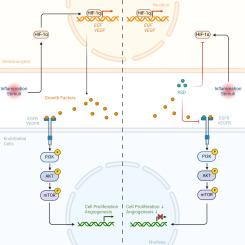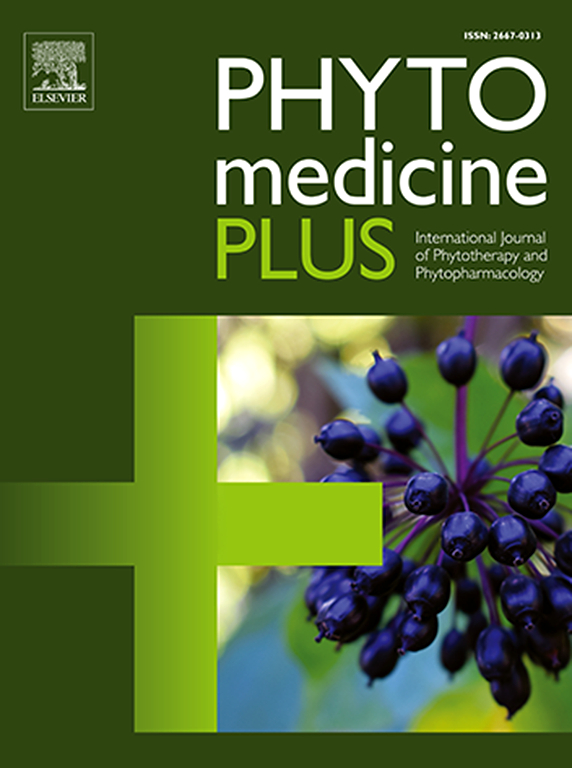第九,手术汤通过下调HIF-1α和EGFR-PI3K-AKT-mTOR通路诱导的血管生成,减轻银屑病样炎症
Q3 Pharmacology, Toxicology and Pharmaceutics
引用次数: 0
摘要
第九外科汤是一种治疗牛皮癣、湿疹、痤疮等炎症性皮肤病的长期临床证实的中药复方。目前尚缺乏9SD在银屑病治疗中的作用研究。本研究探讨9SD治疗银屑病的作用机制。方法采用超高效液相色谱-四极杆飞行时间质谱法对9SD的主要成分进行分析。网络药理学用于识别潜在的靶点和通路。用细胞因子鸡尾酒诱导人角质形成细胞和人脐静脉内皮细胞出现银屑病样炎症,并在体外验证该煎剂的治疗效果。用咪喹莫德诱导的小鼠牛皮癣样皮炎来评估其在体内的作用。利用实时定量聚合酶链反应、酶联免疫吸附试验和western blotting等技术分析组织病理学变化、基因表达和蛋白质水平。结果研究发现,9SD含有多种活性成分,可靶向银屑病的多种途径。研究发现,它通过降低表皮生长因子、血管内皮生长因子和肿瘤坏死因子- α等细胞因子的水平,发挥抗炎作用。此外,该煎剂通过下调缺氧诱导因子1- α和表皮生长因子受体-磷酸肌肽3-激酶-蛋白激酶b的机制靶点来抑制血管生成。结论9SD通过多种途径靶向炎症和血管生成,具有明显的抗银屑病作用。这些发现表明,汤剂可能是一种有希望的治疗银屑病的选择,特别是在调节疾病的血管和炎症方面。本文章由计算机程序翻译,如有差异,请以英文原文为准。

9th surgery decoction alleviates psoriasis-like inflammation through the downregulation of angiogenesis induced by HIF-1α and the EGFR-PI3K-AKT-mTOR pathways
Background
9th Surgery Decoction (9SD) is a long clinically-proved herbal mixture against inflammatory skin diseases like psoriasis, eczema and acne. There still lacks researches revealing the role of 9SD in treatment of psoriasis. This work investigated the mechanism of 9SD in psoriasis treatment.
Methods
The main components of the 9SD were analyzed using ultra-high performance liquid chromatography with quadrupole time-of-flight mass spectrometry. Network pharmacology was employed to identify potential targets and pathways. Psoriasis-like inflammation was induced in human keratinocytes and human umbilical vein endothelial cells using a cytokine cocktail, and the therapeutic effects of the decoction were validated in vitro. Imiquimod-induced psoriasis-like dermatitis in mice was used to assess the effects in vivo. Histopathological changes, gene expression, and protein levels were analyzed using various techniques, including real-time quantitative polymerase chain reaction, enzyme-linked immunosorbent assay, and western blotting.
Results
The study revealed that 9SD contains multiple active components that target various pathways involved in psoriasis. It was found to exert anti-inflammatory effects by reducing the levels of cytokines such as epidermal growth factor, vascular endothelial growth factor, and tumor necrosis factor-alpha. Additionally, the decoction inhibited angiogenesis by downregulating hypoxia-induced factor 1-alpha and the epidermal growth factor receptor-phosphoinositide 3-kinase-protein kinase B-mechanistic target of rapamycin signaling pathways.
Conclusions
The 9SD demonstrates significant anti-psoriatic effects by targeting inflammation and angiogenesis through multiple pathways. These findings suggest that the decoction could be a promising therapeutic option for psoriasis, particularly in modulating the vascular and inflammatory aspects of the disease.
求助全文
通过发布文献求助,成功后即可免费获取论文全文。
去求助
来源期刊

Phytomedicine Plus
Medicine-Complementary and Alternative Medicine
CiteScore
3.70
自引率
0.00%
发文量
178
审稿时长
81 days
期刊介绍:
 求助内容:
求助内容: 应助结果提醒方式:
应助结果提醒方式:


